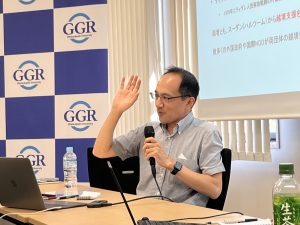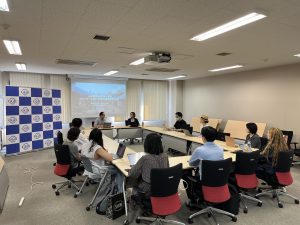On August 29, 2023, the Institute for Global Governance Research (GGR) hosted a GGR Brown Bag Lunch Seminar titled “Humanitarianism in Theory and Practice: The Case of Solidarity-based Assistance in Myanmar” featuring Masao Imamura (Professor, Faculty of Humanities and Social Sciences, Yamagata University).
In this seminar, Prof. Imamura provided an overview on the approach to humanitarian assistance, with a central focus on humanitarian resistance.
Firstly, Prof. Imamura explained the recent trends in humanitarian assistance, highlighting grassroots humanitarian activities by local communities as the most effective form of support. It was noted that these activities are not neutral; they are aimed at countering oppressive regimes and providing aid to those in need. Furthermore, as localization of aid progresses, Prof. Imamura emphasized the importance of prioritizing the self-determination of local communities at the core of humanitarian efforts. Additionally, Prof. Imamura pointed out that while traditional international organizations play an undeniable role in humanitarian assistance in terms of the scale of beneficiaries, their direct impact is limited. Consequently, it was argued that a desirable approach would involve a complementarity between cross-border assistance, which forms solidarity networks beyond borders, and domestically focused aid efforts within local communities. On the other hand, in discussing the risks and challenges associated with cross-border and solidarity-based humanitarian assistance, Prof. Imamura raised two key points: 1) the necessity for cooperation with local governing forces, such as armed organizations, when providing humanitarian aid to places like Myanmar, and 2) the need for appropriate information sharing and provision due to a lack of knowledge on the part of donors regarding humanitarian resistance organizations and armed groups.
During the Q&A session, inquiries arose about the factors that make support through underground networks more impactful in local contexts and the various circumstances surrounding Thailand, which serves as the headquarters for a number of Myanmar aid organizations, and how these factors may influence future trends in assistance. In response to these questions, Prof. Imamura stressed the importance of maintaining a local-centric approach in humanitarian support and the long-lasting tendency of Thailand to provide long-term supportive attitudes.
【Event Report Prepared by】
Juno Kim (Bachelor’s student, Faculty of Law)


